Let me digress a bit in starting this by talking about the Chicago Cubs.
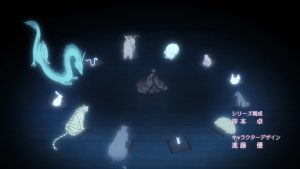 I’ve been a Fruits Basket– well, “fan” isn’t really the right word, but I’ll get to that – for a long time. But I’ve been a Cubs fan even longer, probably since I was about four years old. Every instinct is to live and die by the team’s trials and tribulations, but in recent years I’ve come to detest the Cubs’ ownership (the Ricketts family) so much that it makes a part of me want to root against the team. This has been an especially venal year for the Cubs’ ownership off the field, and as if by Karma they’re struggling badly. And for all the other reasons I despise the Ricketts, the fact that some part of me is happy about that is more personally aggrieving than any of them.
I’ve been a Fruits Basket– well, “fan” isn’t really the right word, but I’ll get to that – for a long time. But I’ve been a Cubs fan even longer, probably since I was about four years old. Every instinct is to live and die by the team’s trials and tribulations, but in recent years I’ve come to detest the Cubs’ ownership (the Ricketts family) so much that it makes a part of me want to root against the team. This has been an especially venal year for the Cubs’ ownership off the field, and as if by Karma they’re struggling badly. And for all the other reasons I despise the Ricketts, the fact that some part of me is happy about that is more personally aggrieving than any of them.
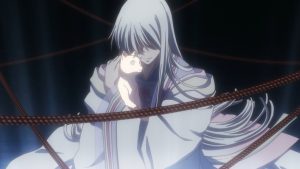 That brings us to Furuba, and no, there’s nothing that dramatic going on here. But to an extent I feel the same conflict. Fruits Basket wasn’t the first anime I ever watched (or loved) but it was in the first half-dozen to be sure. I borrowed it from Japan Video in San Francisco’s Japantown (I still have my membership card) – on VHS, mind you – and lived and died through every episode, astounded by what I was seeing. I adored the series but agonized over the lack of an ending, which ultimately prompted me to read the manga. As a consumer of anime, never mind a writer, Fruits Basket is a part of my genetic makeup at the base-pair level.
That brings us to Furuba, and no, there’s nothing that dramatic going on here. But to an extent I feel the same conflict. Fruits Basket wasn’t the first anime I ever watched (or loved) but it was in the first half-dozen to be sure. I borrowed it from Japan Video in San Francisco’s Japantown (I still have my membership card) – on VHS, mind you – and lived and died through every episode, astounded by what I was seeing. I adored the series but agonized over the lack of an ending, which ultimately prompted me to read the manga. As a consumer of anime, never mind a writer, Fruits Basket is a part of my genetic makeup at the base-pair level.
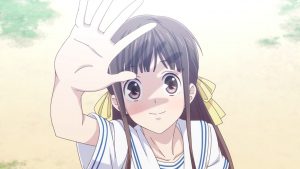 Where this gets complicated for me is with the deep-seated loyalty I feel towards that 2001 anime – towards the music, the cast (especially Horie Yui), and the directorial choices. In plain terms it’s better than the manga IMHO, and the changes director Akitarou Daichi made are the reason. Mangaka Takaya Natsuki disagrees, which she has every right to. But she hasn’t just disagreed – she’s gone out of her way to belittle everyone involved in that series, and make sure the new one has no connection to it whatsoever. Again, fair game – Furuba is her baby. But when her attacks gets personal, it feels very personal for me. And it makes a little part of me root against this remake, which I really hate.
Where this gets complicated for me is with the deep-seated loyalty I feel towards that 2001 anime – towards the music, the cast (especially Horie Yui), and the directorial choices. In plain terms it’s better than the manga IMHO, and the changes director Akitarou Daichi made are the reason. Mangaka Takaya Natsuki disagrees, which she has every right to. But she hasn’t just disagreed – she’s gone out of her way to belittle everyone involved in that series, and make sure the new one has no connection to it whatsoever. Again, fair game – Furuba is her baby. But when her attacks gets personal, it feels very personal for me. And it makes a little part of me root against this remake, which I really hate.
 And that, in roundabout terms, brings us to this premiere, but I hope you’ll forgive the scenic route because I think it’s important that my conflicted feelings about this show are clear. And I am conflicted, totally – it’s hard to overstate how weird it was to be watching Fruits Basket again after all these years, which would have been the case even without the aforementioned complications. And even stranger not to hear Hochan’s voice when Honda Tohru speaks. I have no idea if Hochan could even pull the role off – she’s 42 now, but in my mind’s eye she’s the classic “ever 17” seiyuu where this role is concerned – but that doesn’t make listening to Iwami Manaka’s (20) Tohru any less weird.
And that, in roundabout terms, brings us to this premiere, but I hope you’ll forgive the scenic route because I think it’s important that my conflicted feelings about this show are clear. And I am conflicted, totally – it’s hard to overstate how weird it was to be watching Fruits Basket again after all these years, which would have been the case even without the aforementioned complications. And even stranger not to hear Hochan’s voice when Honda Tohru speaks. I have no idea if Hochan could even pull the role off – she’s 42 now, but in my mind’s eye she’s the classic “ever 17” seiyuu where this role is concerned – but that doesn’t make listening to Iwami Manaka’s (20) Tohru any less weird.
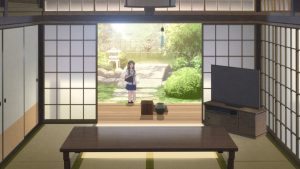 For a while. But the truth is – and this was genuinely anything but a foregone conclusion going in – I thought this premiere was quite superb, and so was Iwami. In a sense this is the easy part, because as best I recall both series’ first episodes were just about scene-by-scene identical (the changes came later). Nevertheless, it didn’t take that long before I was totally wrapped up in this story again – which was in itself an incredibly weird feeling, believe me. Director Ibata Yoshihide hasn’t got much of a resume apart from co-directing the sequel to another turn-of-the-century classic, FLCL – a sequel that was an abomination which never should’ve existed but for which it seems silly to blame him. But his work here is… impressive. And TMS, fairly “neutral” as anime studios go, seems to have delivered the goods production-wise.
For a while. But the truth is – and this was genuinely anything but a foregone conclusion going in – I thought this premiere was quite superb, and so was Iwami. In a sense this is the easy part, because as best I recall both series’ first episodes were just about scene-by-scene identical (the changes came later). Nevertheless, it didn’t take that long before I was totally wrapped up in this story again – which was in itself an incredibly weird feeling, believe me. Director Ibata Yoshihide hasn’t got much of a resume apart from co-directing the sequel to another turn-of-the-century classic, FLCL – a sequel that was an abomination which never should’ve existed but for which it seems silly to blame him. But his work here is… impressive. And TMS, fairly “neutral” as anime studios go, seems to have delivered the goods production-wise.
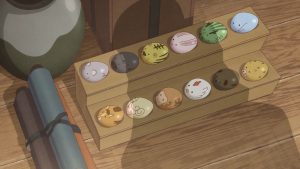 What gives me hope for this version is that the adaptation is being handled by Kishimoto Taku, who by contrast to Ibata has a long and accomplished anime resume. And of course, as with Rurouni Kenshin, Fruits Basket is a series for which a reboot is utterly logical – the manga was never fully adapted. This is being billed as “Season 1” and we know the initial release is coming as two split cours, but two cours aren’t enough to fully adapt the manga. I’m assuming this production wouldn’t have been undertaken without the intent to do just that, so the real question is just what kind of timetable we’re talking about to make that happen (the ED features characters – who may be my favorites – whose casting hasn’t even been announced yet). How many eps do we need? I think four cours minimum, personally.
What gives me hope for this version is that the adaptation is being handled by Kishimoto Taku, who by contrast to Ibata has a long and accomplished anime resume. And of course, as with Rurouni Kenshin, Fruits Basket is a series for which a reboot is utterly logical – the manga was never fully adapted. This is being billed as “Season 1” and we know the initial release is coming as two split cours, but two cours aren’t enough to fully adapt the manga. I’m assuming this production wouldn’t have been undertaken without the intent to do just that, so the real question is just what kind of timetable we’re talking about to make that happen (the ED features characters – who may be my favorites – whose casting hasn’t even been announced yet). How many eps do we need? I think four cours minimum, personally.
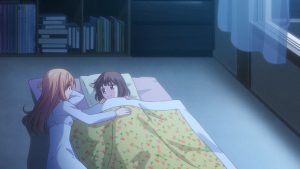 I haven’t talked about the plot or characters yet and we’re six paragraphs in, and I know most viewers aren’t going to be as intimately familiar with those as I am. The premise is familiar-sounding (not surprising given how influential this series was) – a young girl living alone, taken in by a rich ikemen and his older cousin. What makes Furuba click is the poignancy of the characters’ stories, starting with Tohru’s loss of her mother and extending to the individual circumstances of the Souma family which takes her in. I’m not going to talk about those much yet for the benefit of those who don’t know the story, but believe me we haven’t even seen the tip of the iceberg in that department and it’s going to be a while before we do.
I haven’t talked about the plot or characters yet and we’re six paragraphs in, and I know most viewers aren’t going to be as intimately familiar with those as I am. The premise is familiar-sounding (not surprising given how influential this series was) – a young girl living alone, taken in by a rich ikemen and his older cousin. What makes Furuba click is the poignancy of the characters’ stories, starting with Tohru’s loss of her mother and extending to the individual circumstances of the Souma family which takes her in. I’m not going to talk about those much yet for the benefit of those who don’t know the story, but believe me we haven’t even seen the tip of the iceberg in that department and it’s going to be a while before we do.
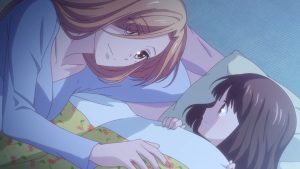 What we know is that Tohru’s mom told her the tale of the Chinese zodiac when she was a toddler, and her sympathies lay with the cat who was tricked by the rat into missing the banquet, and forever excluded from the zodiac as a result. The Soumas’ connections to the zodiac are obvious immediately. Shigure (Nakamura Yuuichi) is the dog, and Tohru’s classmate Yuki (Shimazaki Nobunaga) is the rat (who hates the cat). Her circumstances have forced Tohru to live in a tent which happens to be on Souma land, and a slide of some of that land eventually leads her to her being taken into their house. There she meets another boy her own age, Kyou (Uchida Yuuma), and inadvertently causes him to reveal the Souma family secret.
What we know is that Tohru’s mom told her the tale of the Chinese zodiac when she was a toddler, and her sympathies lay with the cat who was tricked by the rat into missing the banquet, and forever excluded from the zodiac as a result. The Soumas’ connections to the zodiac are obvious immediately. Shigure (Nakamura Yuuichi) is the dog, and Tohru’s classmate Yuki (Shimazaki Nobunaga) is the rat (who hates the cat). Her circumstances have forced Tohru to live in a tent which happens to be on Souma land, and a slide of some of that land eventually leads her to her being taken into their house. There she meets another boy her own age, Kyou (Uchida Yuuma), and inadvertently causes him to reveal the Souma family secret.
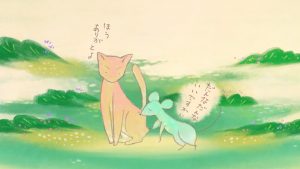 All of these seiyuu are at least fine, and they all have big shoes to fill – Yuki especially is a bit jarring, as he was played by a woman (Hisakawa Aya) in the original. The dialogue, the chemistry, the backgrounds – honestly, for me it all works just about as well I could have hoped. More than anything I found myself not wanting the episode to end (always a good sign), because knowing what was coming I wanted to wade into that sea of feels as quickly as possible. We’ll see what happens once Kishimoto and Ibata have to steer the story away from where Akitarou took it (and deal with Takaya’s intense involvement, it sounds like), but for one week at least Fruits Basket 2019 provided a glorious window to emotions I haven’t felt in a very long time, and for that I’m grateful.
All of these seiyuu are at least fine, and they all have big shoes to fill – Yuki especially is a bit jarring, as he was played by a woman (Hisakawa Aya) in the original. The dialogue, the chemistry, the backgrounds – honestly, for me it all works just about as well I could have hoped. More than anything I found myself not wanting the episode to end (always a good sign), because knowing what was coming I wanted to wade into that sea of feels as quickly as possible. We’ll see what happens once Kishimoto and Ibata have to steer the story away from where Akitarou took it (and deal with Takaya’s intense involvement, it sounds like), but for one week at least Fruits Basket 2019 provided a glorious window to emotions I haven’t felt in a very long time, and for that I’m grateful.
ED: “Lucky Ending” by Vickeblanka


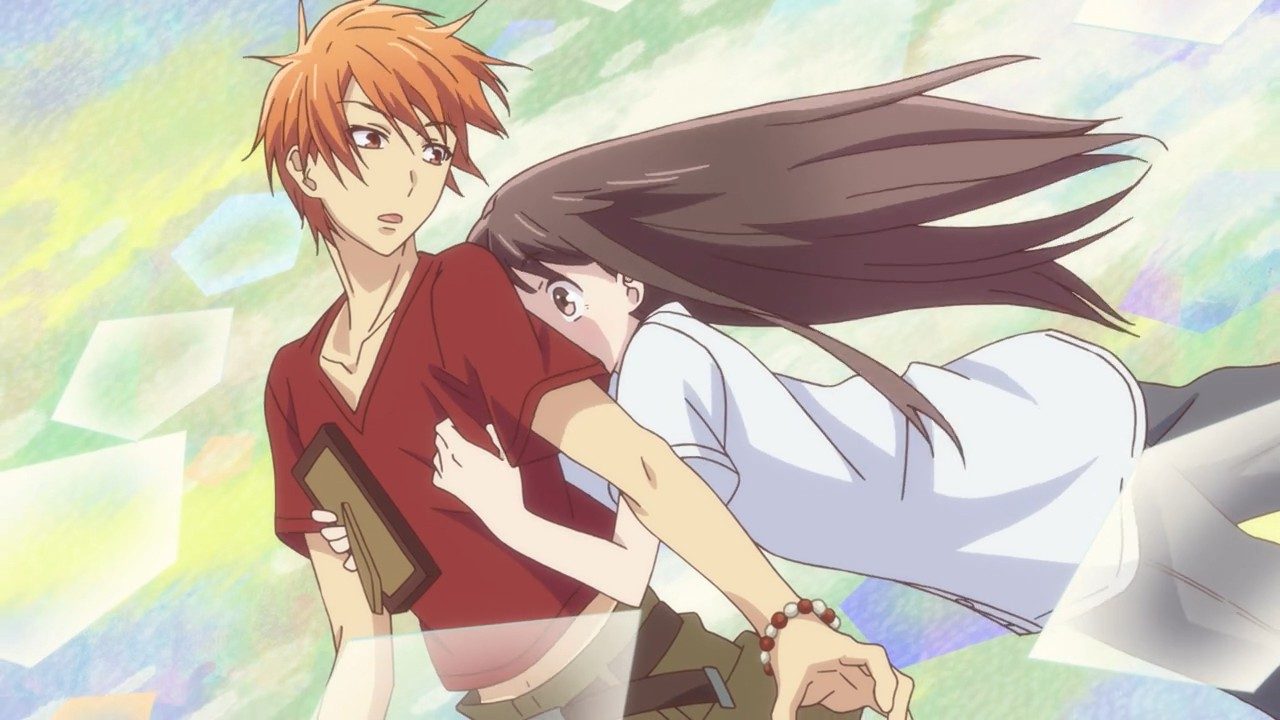
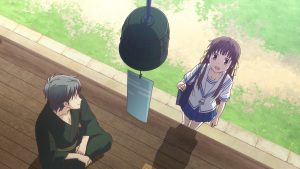
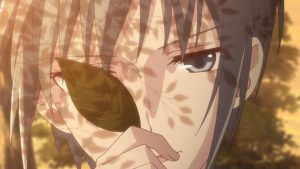
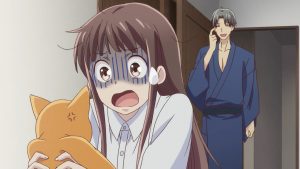
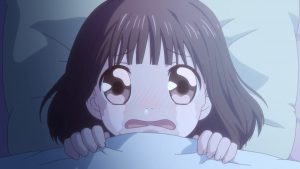
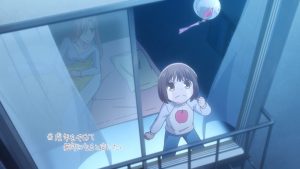
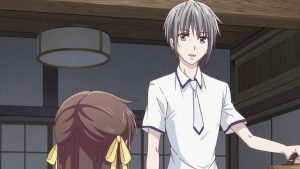

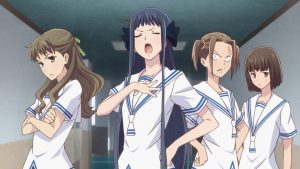
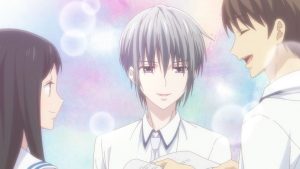
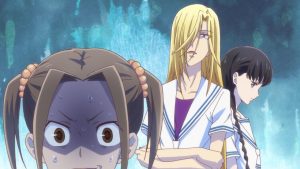
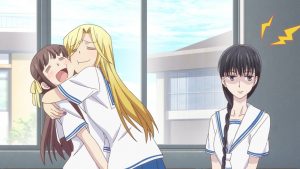
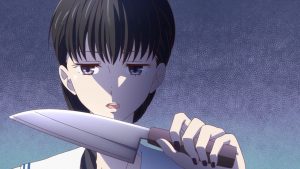
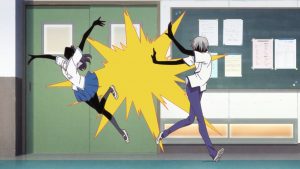
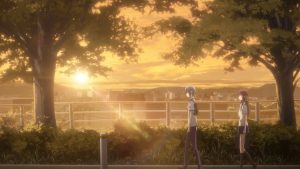
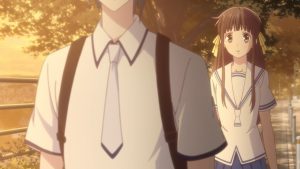
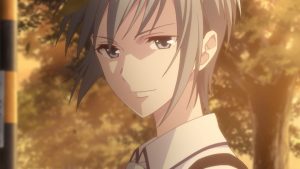
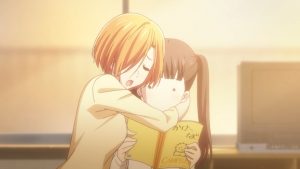
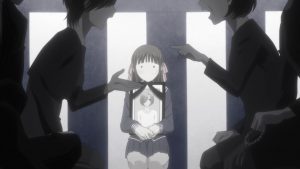
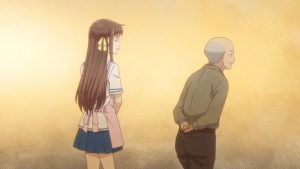
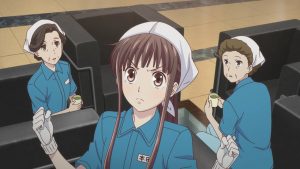

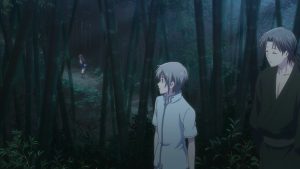
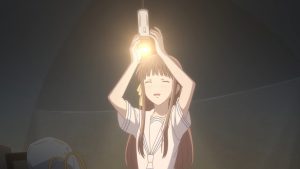

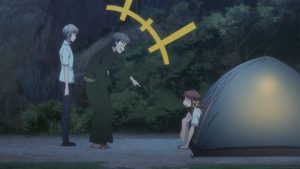

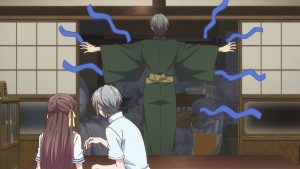

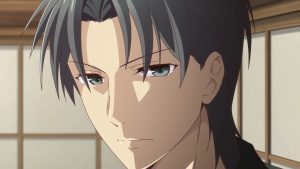
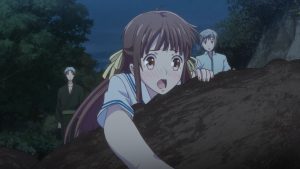
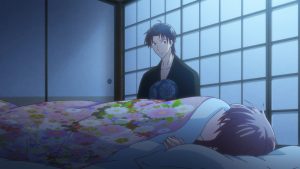
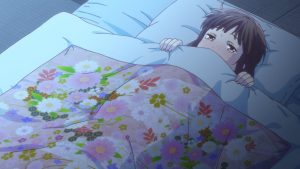
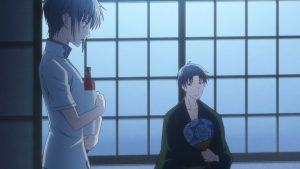
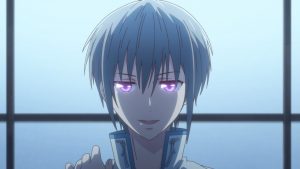

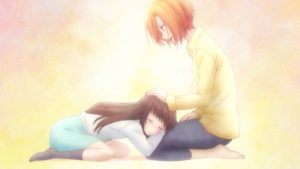
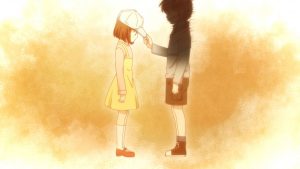
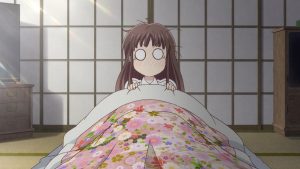
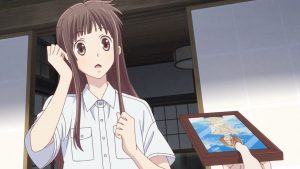
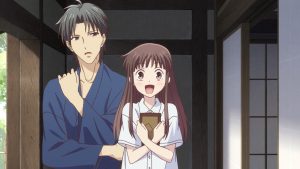
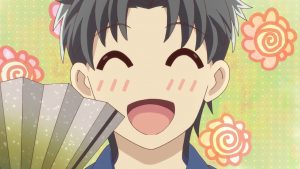
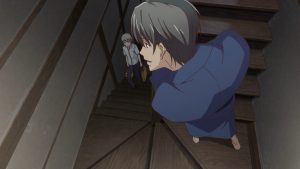
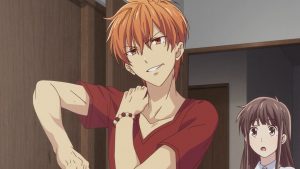
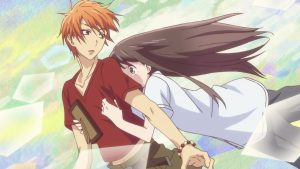
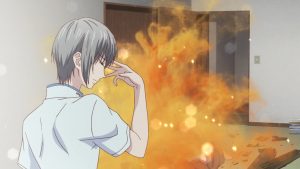
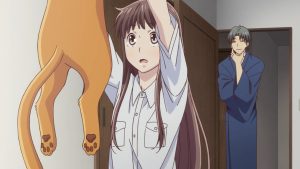
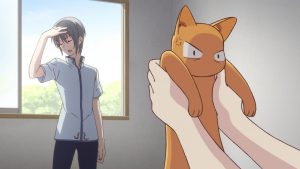
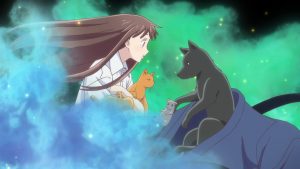
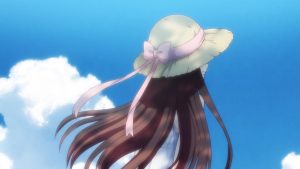
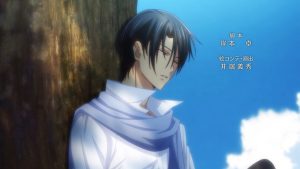
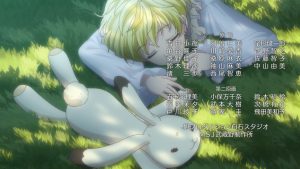
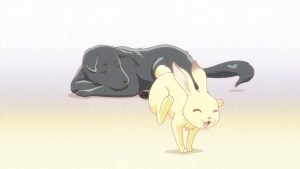
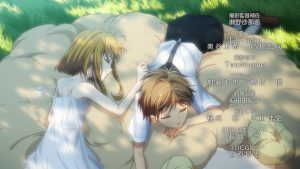
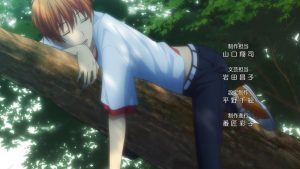
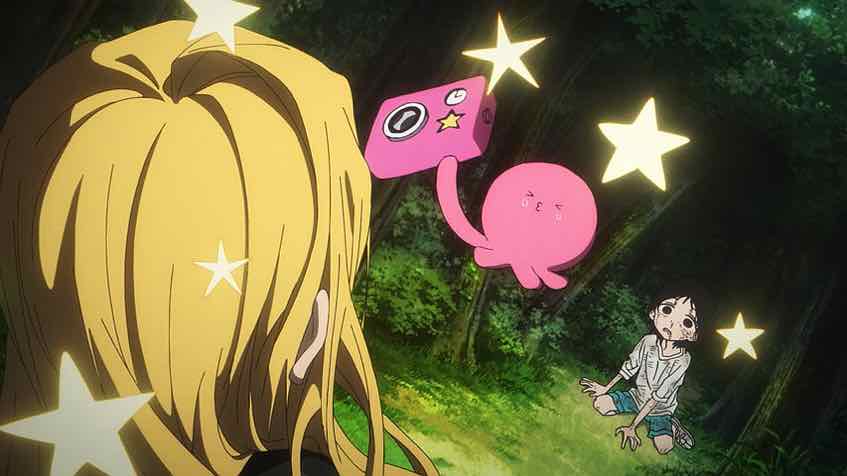
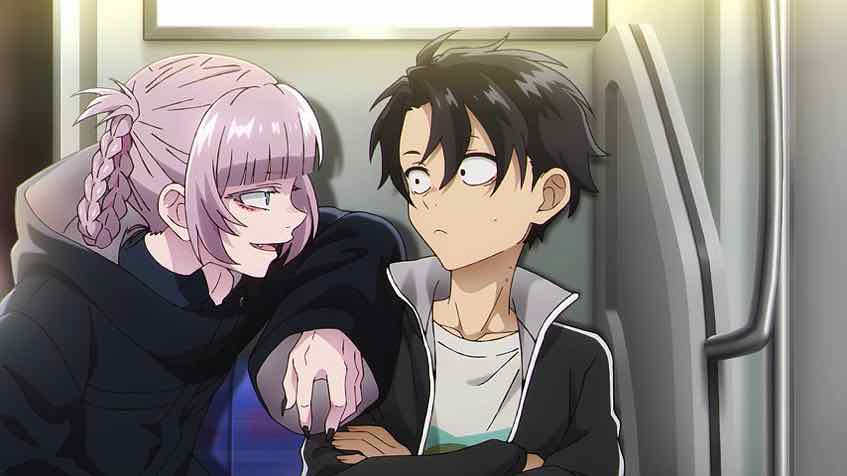
Gracie
April 6, 2019 at 8:00 pmI think you mean Yuki, not Kyou. Yuki was voiced by Aya Hisakawa.
Guardian Enzo
April 6, 2019 at 8:17 pmYup, that’s what I meant. Been a long time since I thought about any of these names.
Aeon
April 6, 2019 at 10:06 pmI’m extremely curious about the mangaka’s dislike of the 2001 adaptation—this is actually news to me. I can understand if it was in reference to the last two episodes, but the series as a whole? Whoa.
Watching the premiere, I kept expecting to hear the same music and see the comedic bits but not getting either. Nevertheless, I liked it (the ED is lovely). The voice cast is also pretty good (Yuki’s more masculine voice notwithstanding).
Guardian Enzo
April 6, 2019 at 10:11 pmI agree, the ED is really good – both visually and sonically. Seems like a first-class production all around.
Personally I’d be happier if I never knew about Takaya’s vendetta against the 2001 anime, but if you want to know there’s plenty out there that Google searches will turn up. She’s never been shy about her opinions. I even remember Akitarou Daichi saying in the director’s commentary on the original U.S. release (this is probably 15 or 16 years ago) that he didn’t think there’d ever be a sequel because the mangaka hated the adaptation.
Gracie
April 7, 2019 at 7:06 amThe mangaka’s comments really leave a sour taste. What happened to being overly solicitous… Banning everyone from the old production from participating as if they were lepers. Like lady SIT DOWN. You’re comments are in poor taste and a disgrace to your work. So you have a beef with the director, but what do you have against the others.
Snowball
April 7, 2019 at 5:13 amI felt emotionally disconnected with this first episode compared to the first anime series, perhaps it’s the soundtrack, but that’s fine because it’s only the first episode. The visuals are great and I hope it continues.
Bokusen
April 8, 2019 at 7:11 amI’m glad someone else felt that way too. The comedy scenes were much better done in the first anime, while in this one they kept missing the mark for me. I loved the first Fruits Basket anime, so I was hoping I’d like this one too, but I just felt extremely disconnected from everything going on. The comedic scenes kept missing the mark for me, and it felt like they were much better done in the first series. I was going to say that the new anime needs a director who can do both comedy and dramatic scenes well, and was going to use as an example whoever directed Kamisama Hajimemashita/ Kamisama Kiss, but then I looked it up and the person who directed Kamisama Hajimemashita also directed the first Fruits Basket anime.^-^; No wonder the no series felt similar somehow…I wish he came back, but I know that had no chance of happening since the mangaka hated the first anime. 🙁
Ronbb
April 7, 2019 at 3:39 pmI’m new to Fruits Basket, so everything is new and decent to me. I was a little uncomfortable with the comment about bringing a woman in for the housework, but that was probably a convenient way to move the plot forward…not a good one, but I let it slide, thinking the writing will become better.
As an aside, it may be too early to tell, but it feels like Spring is weaker than Winter…am glad that Dororo is a two-cour.
Guardian Enzo
April 7, 2019 at 5:13 pmAs I noted in the preview, the gender roles in Fruits Basket can seem very old-fashioned. In fact I’ve always felt (though she never said so) that one of the things Takaya didn’t like about the first anime is that Akitarou made Tohru a more assertive character than she is in the manga.
Simone
April 7, 2019 at 10:46 pm“that was probably a convenient way to move the plot forward…not a good one, but I let it slide, thinking the writing will become better”
Well, to be fair, similarly to what was seen in “Shounen Maid”, to me that felt just the product of Japanese work ethic more than gender roles. Basically saying that Tohru will feel more comfortable knowing she’s got work to do (and is being “paid” with room and board) rather than just being a freeloader.
Guardian Enzo
April 7, 2019 at 10:54 pmThat’s a solid point.
Ronbb
April 8, 2019 at 1:50 amThanks for sharing your viewpoint. I actually think the same, and can agree with the idea of an in-kind service — which is the convenient way to move the plot forward. I’d still think that it’s an issue of gender roles. That line could have been, ” Let’s bring someone in for the housework.” And I was thinking, “It’s a new adaptation. Changing one word/one line doesn’t hurt at all. The story could still be intact, but it’s kept as-is…”
Oh well, I don’t agree with but can accept for one line in a Japanese story…I want to accept and stay open-minded for the story to unfold :).
dairo
April 9, 2019 at 6:53 pmExcuse me but can you please explain to me your reasoning that Tohru is more assertive in the 2001 anime than she is the manga? I don’t understand.
JJ
April 8, 2019 at 1:51 amThanks for taking my thoughts out of my head for me. My full-time commitment came almost exactly after the original adaptation, so I think (hope) I can come into this version without any notions of what went before.
From my POV, it was a solid episode aside from Tohru immediately (and being expected to) take to the housework. I’m in for now.
Christine
April 8, 2019 at 3:51 amGreat review, I’m really impressed at how engrossing this episode was despite how familiar I am with the manga and first anime. Looking forward to reading your take on the series this season!
Regarding Takaya’s reported dislike of Akitaro Daichi, I wonder if there is any connection between their clash and the recent allegations against the director. Takaya didn’t seem to blindly hate everything about the original series, she had nothing but praise for Ritsuko Okazaki’s songs (especially the theme song). If Okazaki hadn’t passed away, maybe Takaya would have asked her to return for this reboot.
Guardian Enzo
April 9, 2019 at 7:03 pmI have no idea if she was even aware of what was allegedly going on with Akitarou, but she’s been criticizing the anime practically since it was airing so it seems unlikely to me that’s the source of her disapproval. I also don’t think as the author of the source material she’d have had much contact with him (indeed, I think she considered that part of the problem) but I suppose it’s possible she heard things indirectly.